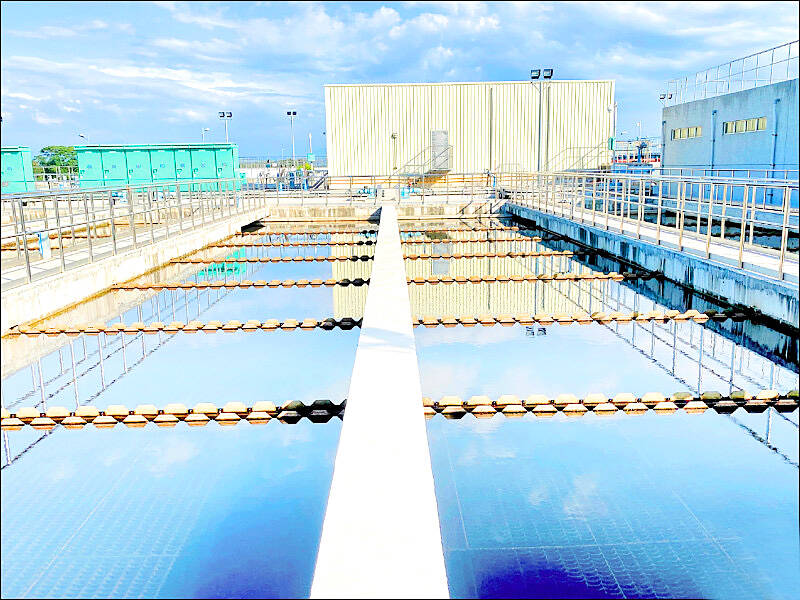The government would bolster the control of perfluorinated and polyfluorinated alkyl substances (PFAS), also known as “forever chemicals” in drinking water following the discovery of a correlation between PFAS exposure and an elevated risk of a range of illnesses, including some types of cancer, a Ministry of Environment official said yesterday.
A link between PFAS and increased risk of cardiovascular diseases, fertility problems and child developmental disorders was also found, the ministry said.
The ministry would this month issue a notice amending the Drinking Water Quality Standards to ensure PFAS standards are on a par with Japan and Australia, Ministry of Environment Water Quality Protection Division Director Wang Yeuh-bin (王嶽斌) said.

Photo: Taipei Times file
The ministry published an amendment to the Categories and Management of Handling for Toxic Chemical Substances on April 24, adding types of PFAS such as perfluorohexane sulfonic acid (PFHxS), its salts and PFHxS-related compounds (147 substances in total) to the list of strictly prohibited toxic chemical substances to comply with the Stockholm Convention on Persistent Organic Pollutants.
The Stockholm Convention on Persistent Organic Pollutants is an international environmental treaty aimed at eliminating or restricting the production and use of persistent organic pollutants to protect human health and the environment from their harmful effects.
Due to their high toxicity, PFHxS, its salts and related compounds are prohibited from being used in Taiwan other than for research, testing and education, the amendment states.
As PFAS might cause adverse health effects to humans if consumed in drinking water, the ministry said it tasked National Cheng Kung University with investigating drinking water contaminants last year.
Chemicals in the PFAS family, including perfluorooctanoic acid (PFOA), perfluorooctane sulfonic acid (PFOS) and PFHxS were each tested for 50 times, it said.
A higher-than-permitted PFOS level was detected once and an excess of PFHxS was found twice, the university report said.
Government agencies have set up guidelines for detection methods and how to manage the chemicals, Wang said.
As part of the guidelines, PFOA and PFOS levels would be capped at 50 nanograms per liter, while PFOS and PFHxS must be less than 70 nanograms per liter, Wang said.
These standards are the same as Australia’s limits.
Legal procedures are in progress and the guidelines would be legislated this month at the earliest, Wang said, adding that the new measures would make Taiwan the first Asian country to legalize standards for PFAS drinking water quality.
In the future, if tests showed drinking water failed to meet standards, testing and improvement would be required within a time limit. Drinking water suppliers found to have not complied with the standards could face a fine of NT$60,000 to NT$600,000 (US$1,848 to US$18,484), Wang added.
Subsequent regulations, including water discharge standards, and water pollution prevention and control measures, would also be included in PFAS control regulations. Preparations for relevant legal work are under way.

The Coast Guard Administration (CGA) yesterday said it had deployed patrol vessels to expel a China Coast Guard ship and a Chinese fishing boat near Pratas Island (Dongsha Island, 東沙群島) in the South China Sea. The China Coast Guard vessel was 28 nautical miles (52km) northeast of Pratas at 6:15am on Thursday, approaching the island’s restricted waters, which extend 24 nautical miles from its shoreline, the CGA’s Dongsha-Nansha Branch said in a statement. The Tainan, a 2,000-tonne cutter, was deployed by the CGA to shadow the Chinese ship, which left the area at 2:39pm on Friday, the statement said. At 6:31pm on Friday,

The Chinese People’s Liberation Army Navy’s (PLAN) third aircraft carrier, the Fujian, would pose a steep challenge to Taiwan’s ability to defend itself against a full-scale invasion, a defense expert said yesterday. Institute of National Defense and Security Research analyst Chieh Chung (揭仲) made the comment hours after the PLAN confirmed the carrier recently passed through the Taiwan Strait to conduct “scientific research tests and training missions” in the South China Sea. China has two carriers in operation — the Liaoning and the Shandong — with the Fujian undergoing sea trials. Although the PLAN needs time to train the Fujian’s air wing and

Taiwanese celebrities Hank Chen (陳漢典) and Lulu Huang (黃路梓茵) announced yesterday that they are planning to marry. Huang announced and posted photos of their engagement to her social media pages yesterday morning, joking that the pair were not just doing marketing for a new show, but “really getting married.” “We’ve decided to spend all of our future happy and hilarious moments together,” she wrote. The announcement, which was later confirmed by the talent agency they share, appeared to come as a surprise even to those around them, with veteran TV host Jacky Wu (吳宗憲) saying he was “totally taken aback” by the news. Huang,

The American Institute in Taiwan (AIT) put Taiwan in danger, Ma Ying-jeou Foundation director Hsiao Hsu-tsen (蕭旭岑) said yesterday, hours after the de facto US embassy said that Beijing had misinterpreted World War II-era documents to isolate Taiwan. The AIT’s comments harmed the Republic of China’s (ROC) national interests and contradicted a part of the “six assurances” stipulating that the US would not change its official position on Taiwan’s sovereignty, Hsiao said. The “six assurances,” which were given by then-US president Ronald Reagan to Taiwan in 1982, say that Washington would not set a date for ending arm sales to Taiwan, consult